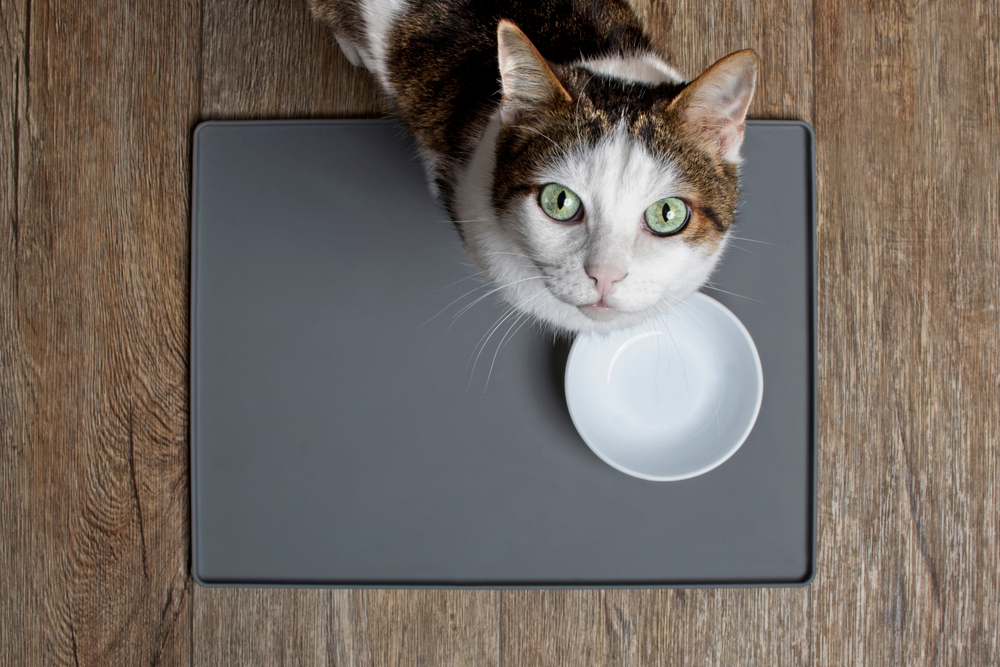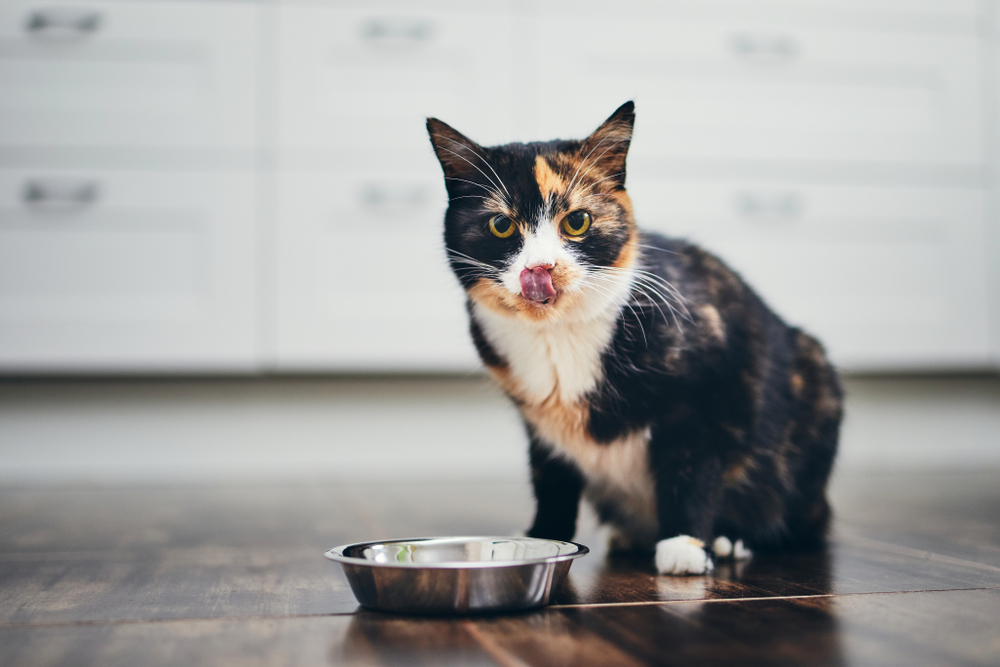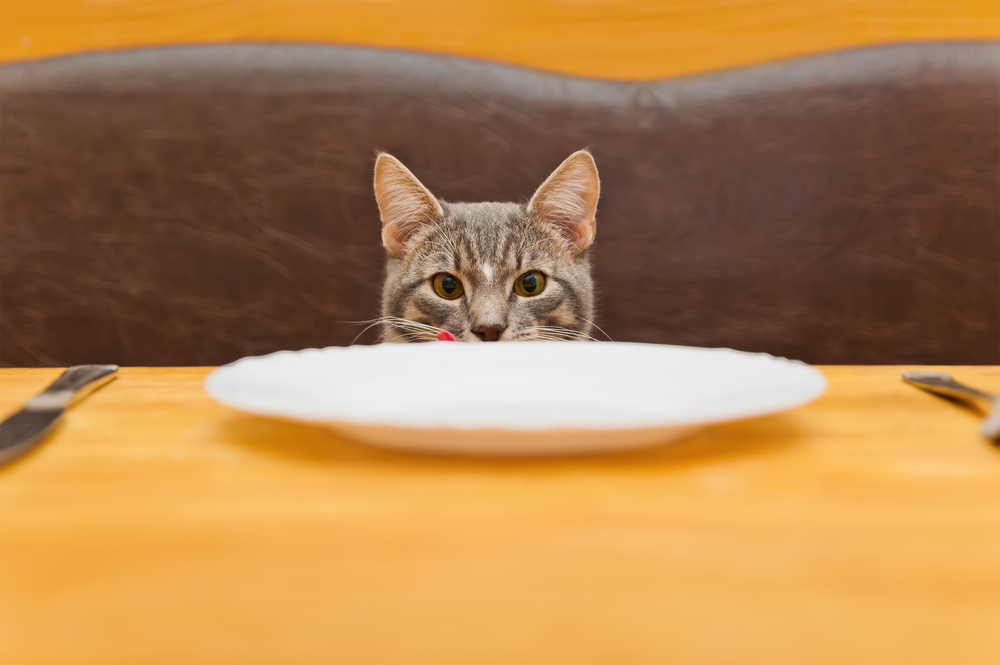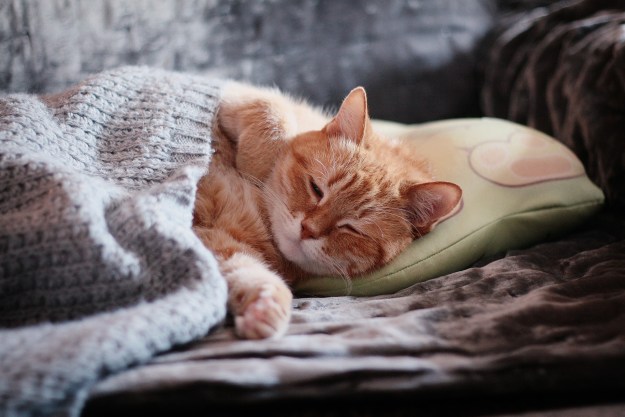We all know that cats are beloved members of the family, so it’s normal to be tempted to share your favorite snack with them. But sharing human food with your fur baby can be harmful to your cat if your favorite noshes are on the American Society for the Prevention of Cruelty to Animals’ list of toxic food for cats. As responsible, devoted pet parents, you want to avoid risking giving your feline friend foods that could make her ill. These are the top 10 common household foods unsafe for cats.

10 foods that aren’t safe for your cat
The symptoms caused by eating the following foods vary in severity, but they should still be avoided.
1. Alcohol
One of the most dangerous substances for cats, alcohol can lead to mild symptoms like diarrhea and vomiting when consumed, but it can also cause depressed breathing, seizures, coma, and potentially death. Never leave an opened alcoholic drink unattended in your cat’s presence. If your cat consumes alcohol, take her to the vet for immediate treatment. Your fur baby’s life could depend on it.
2. Caffeine, chocolate, and coffee
Three of our all-time favorites contain methylxanthines, which can cause excessive thirst, diarrhea, vomiting, tachyarrhythmia (irregular heartbeat), seizures, and death. Caffeine is especially deadly to cats, as their small bodies are highly sensitive to its effects. You don’t need to panic if your fur baby takes a single sip of your iced coffee, but consumption of even one caffeine pill may have fatal consequences. In addition to gastrointestinal symptoms, caffeine can cause a dangerous spike in blood pressure, cardiac arrhythmia, organ damage to the heart, lungs, central nervous system, liver, and kidneys, all of which have potentially fatal ramifications.
3. Dairy
In spite of countless pop-culture depictions of cats being given saucers of cream as a treat, your feline fur baby is actually lactose intolerant. Giving cats dairy products like milk, cream, and cheese can cause gastrointestinal distress. Side effects include flatulence, nausea, vomiting, and diarrhea.
4. Garlic and onions
Garlic and onions add punchy flavor to our favorite dishes, but they also contain the oxidant n-propyl disulfide, which damages red blood cells. If ingested, your cat’s body will attack her own red blood cells in an attempt to remove the foreign substance, causing hemolysis, or the destruction of red blood cells. Fainting, lethargy, and pale gums are all side effects of garlic and onion consumption, and you should take your fur baby to the vet immediately if you suspect she’s eaten foods containing either.

5. Grapes and raisins
While these toxins aren’t as widely known as others, grapes and raisins can cause extensive kidney damage to your feline friend. If she ingests large enough quantities, the damage is often fatal. No one knows precisely why grapes and raisins are so toxic to cats, but they should be avoided at all costs. Clean up wine spills, be careful when making PB&J sandwiches with grape jelly, and keep an eye out for grapes and raisins in your favorite trail mix, which should never be left uncovered.
6. Nuts
Nuts contain beneficial omega-3 fatty acids, but they’re also high in fat in a general sense. Consumption of too much fat leads to digestion problems like flatulence, vomiting, and diarrhea. Oily nuts like pecans, macadamia nuts, walnuts, and almonds should be avoided to prevent your fur baby from suffering stomach upset.
7. Raw foods
Cats are obligate carnivores, but while feral cats eat raw meat in the wild, it can be dangerous for your domesticated fur baby. Raw meat and eggs contain bacteria that can lead to foodborne illness. Even more dangerous is raw fish, which contains an enzyme capable of destroying thiamine. Without thiamine, your cat may suffer from severe neurological problems, resulting in seizures, coma, and even death.
8. Salty snack foods
Just because you love snacking on trail mix doesn’t mean it’s safe for your cat to do so. Salt is sometimes used as an emetic for cats and dogs, so don’t be surprised if your cat vomits after eating salty snacks. Better yet, store your favorite snack mix well out of reach to prevent digestive upset.
9. Xylitol
This common artificial sweetener is highly toxic to pets, causing their bodies to produce a rush of insulin that leads to low blood sugar. Unfortunately, even ingesting a small number of products containing xylitol may lead to liver failure or death. Check the ingredients list on your snacks, gum, soft drinks, and even your toothpaste to make sure your cat won’t be exposed.
10. Yeast dough
For us, bread is a tasty treat, but it’s extremely dangerous to cats if it’s not cooked thoroughly. Uncooked yeast dough releases alcohol and carbon dioxide into your cat’s system, which can have life-threatening consequences. Bread has no nutritional value for cats, so the best way to avoid danger is to skip giving them baked goods at all.

Your cat’s health and security are important to you, and keeping a toxin-free home is one of the best ways to ensure that your fur baby is safe from harm. Don’t leave human food and drink unattended, keep snacks containing potential toxins stored where your cat can’t reach them, and contact your vet immediately if you suspect that your cat has eaten something she shouldn’t.
Editors' Recommendations
- Wondering why cats chirp? Fascinating reasons why your cat chirps at birds (and you)
- How to tell if your cat is a Maine Coon mix (and why you should care)
- Your cat trilling is actually a good thing – here’s why
- Why doesn’t my cat meow? Here are 5 reasons why your feline friend is silent
- Is your cat hissing and growling a lot? These 5 tips will work wonders on your feline friend




